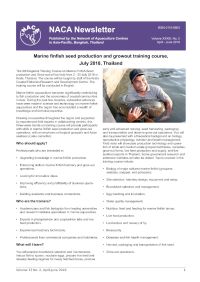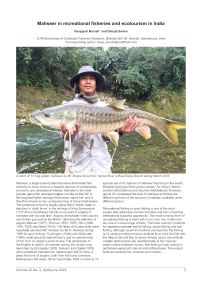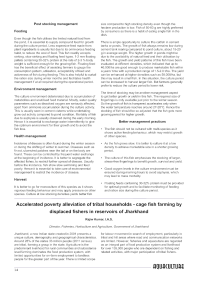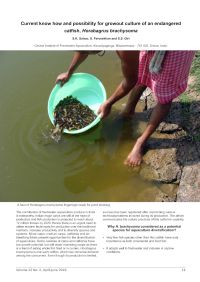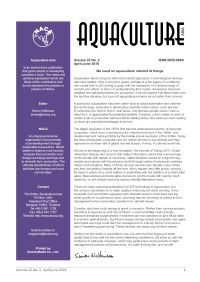In this issue:
Marine finfish seed production and growout training course, Thailand; global fish passage forum to include first symposium on hydropower and fish; International Workshop on Rehabilitation, Propagation and Conservation of Mahseer, India; World Brackishwater Aquaculture Conference, January 2019, India; Offshore Mariculture Asia 2018, 15-17 May, Singapore; Video lectures: Regional Training Course on Culture-based Fisheries in Inland Waters; Youth and Fish Drawing Competition Art Book; Report of the Sixteenth Meeting of the Asia Regional Advisory Group on Aquatic Animal Health.
Mahseer are the most popular game fish amongst anglers in India, with a reputation as one of the toughest fighters amongst freshwater sports fish. In this article, we have made an attempt to compile information on recreational mahseer fisheries in India. The importance of the mighty mahseer as a game fish is told through the perspectives of active anglers and the visions of stakeholders and researchers in conservation and ecotourism are presented.
Jharkhand, India, has a significant population of tribal people, around 28% of the state's 33 million. Agriculture is the main livelihood and subsistence-level farming is predominant, offering limited opportunities for employment to landless people for most of the year. This article documents the experience of the Jharkhand Department of Fisheries in developing cage-based aquaculture as an alternative livelihood for tribal fishers that had been displaced by the construction of reservoirs, working in association with fisher collectives.
Current know-how and possibility for growout culture of an endangered catfish, Horabagrus brachysoma
Some varieties of freshwater fish have low growth potential but remain economically attractive due to market preferences. The endangered catfish Horabagrus brachysoma is one such fish, which has limited production but high market demand, and a number of favourable biological characteristics. This article provides guidelines for the culture of this catfish in captivity including for the breeding, nursery, stocking and growout, including advice on pre- and post-stocking practices, harvesting and health management.
We are at the beginning of a new revolution, the Internet of Things (IOT): Smart networked devices and sensors that collect information about their surroundings, communicate with people and machines, make decisions based on programming models and interact with the physical world through control of switches, motors and actuators. Many of these devices are low-cost, literally a few dollars and they are getting cheaper all the time. The IOT offers new opportunities for the aquaculture industry to improve on-farm efficiency.
